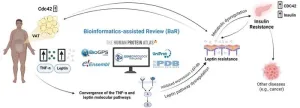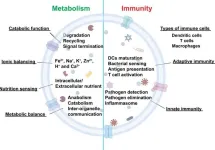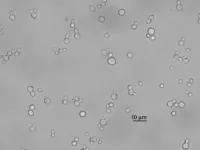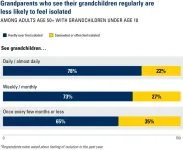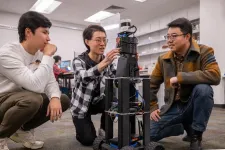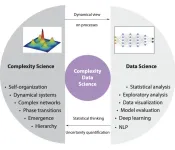(Press-News.org) The American Pediatric Society (APS) is pleased to announce ninety-eight new members. Founded in 1888, the APS is North America's first and most prestigious academic pediatric organization.
APS members are recognized child health leaders of extraordinary achievement who work together to shape the future of academic pediatrics. Current members nominate new members by recognizing individuals who have distinguished themselves as child health leaders, teachers, scholars, policymakers, and clinicians.
“The Council of the APS is excited to welcome this large group of child health leaders to our membership. This group represents one of the largest group of members to be admitted to the APS in many years. These new members are outstanding advocates, scholars, educators, and clinicians who are making a tremendous impact on the lives of children throughout North America and the world and we are thrilled to welcome them to the APS,” said Clifford W. Bogue, MD, President of the APS.
Benefits of APS membership include:
Recognition and acknowledgment as a leader in pediatrics: APS members include individuals who have distinguished themselves as academic leaders, teachers, and researchers whose contributions to academic pediatrics have garnered national and international recognition.
A network of child health professionals: Membership in APS is dedicated to the advancement of child health through the promotion of pediatric research, recognition of achievement, and cultivation of excellence through advocacy, scholarship, education, and leadership development.
Advocacy for child health: In order to speak with one voice on behalf of child health, APS provides representation in Washington, D.C., through the Pediatric Policy Council which combines the advocacy efforts of the APS, the Society for Pediatric Research, the Association of Medical School Pediatric Department Chairs, and the Academic Pediatric Association.
APS members are eligible to receive the society's annual awards, including the APS John Howland Award, as well as to participate in the APS Howland Visiting Professor program. For more information about APS membership, please visit the APS website.
###
APS 2025 new members include:
Kym Ahrens, MD, MPH, University of Washington School of Medicine
Henry Akinbi, MD, Cincinnati Children's
James Amatruda, MD, PhD, Children's Hospital Los Angeles
Peter Anderson, BA, PhD, University of California, Irvine, School of Medicine
Katherine Auger, MD, MSc, University of Cincinnati College of Medicine
Rochelle Bagatell, MD, Children’s Hospital of Philadelphia
Sarah Bagley, MD, MSc, Boston University School of Medicine
Rajit Basu, MD, Ann & Robert H. Lurie Children's Hospital of Chicago
Rebecca Brady, MD, Cincinnati Children's
Maya Bunik, MD, University of Colorado Anschutz Medical Campus
Rebekah Burns, MD, University of Washington School of Medicine
Raul Chavez-Valdez, MD, Johns Hopkins University School of Medicine
Silvia Chiang, MD, ScM, Hasbro Children's Hospital at Rhode Island Hospital
Valerie Chock, MD, MS Epi, Stanford University School of Medicine
Ryan Coller, MD, University of Wisconsin School of Medicine and Public Health
Ronnie Thomas Collins II, MD, MS, University of Kentucky College of Medicine
Loretta Cordova de Ortega, MD, University of New Mexico Children's Hospital
Fernando Corrales-Medina, MD, University of Miami Leonard M. Miller School of Medicine
Rita Dadiz, DO, University of Rochester School of Medicine and Dentistry
Daniele De Luca, MD, PhD, Université Paris Saclay
Jason Deen, MD, University of Washington School of Medicine
Walter Dehority, MD, MSc, Vanderbilt University School of Medicine
Alan Delamater, PhD, University of Miami Leonard M. Miller School of Medicine
Elisabeth Dellon, MD, MPH, University of North Carolina at Chapel Hill School of Medicine
Lori Devlin, DO, MHA, MS, University of Louisville School of Medicine
Lane Donnelly, MD, University of North Carolina at Chapel Hill School of Medicine
Nadia Dowshen, MD, MSHP, Children’s Hospital of Philadelphia
Mohamed El-Dib, MD, Brigham and Women’s Hospital
Adam Esbenshade, MD, MSCI, Vanderbilt University School of Medicine
Andrew Fine, MD, MPH, Boston Children's Hospital
Erick Forno, MD, MPH, Indiana University School of Medicine
Philippe Friedlich, MD, Children's Hospital Los Angeles
Tanya Froehlich, MD, MS, Cincinnati Children's
James Guevara, MD, MPH, Children’s Hospital of Philadelphia
Ajay Gulati, MD, University of North Carolina at Chapel Hill School of Medicine
Tomas Havranek, MD, Stony Brook Children's Hospital
Lori Holtz, MD, MSPH, Washington University in St. Louis School of Medicine
Patricia, Hopkins, MD, Albany Medical College
Sunah, Hwang, MD, University of Colorado School of Medicine
Lauren Jantzie, PhD, Johns Hopkins University School of Medicine
Jason Jent, PhD, University of Miami Leonard M. Miller School of Medicine
Tiffani Johnson, MD, MSc, University of California, Davis, School of Medicine
Jessica Kahn, MD, MPH, Albert Einstein College of Medicine
Sunitha Kaiser, MD, MSc, University of California, San Francisco, School of Medicine
Beena Kamath-Rayne, MD, MPH, American Academy of Pediatrics
Heather Kaplan, MD, MSCE, Cincinnati Children's
Anup Katheria, MD, University of California, San Diego School of Medicine
Chryso Katsoufis, MD, University of Miami Leonard M. Miller School of Medicine
Jennifer Kesselheim, MD, MEd, MBE, Boston Children's Hospital
Ioannis Koutroulis, MD, PhD, MBA, Children's National
Karen Kuhlthau, PhD, MassGeneral Hospital for Children
Mithya Lewis-Newby, MD, MPH, University of Washington School of Medicine
JoAnna Leyenaar, MD, PhD, MPH, Children's Hospital at Dartmouth-Hitchcock
Gregory Lodygensky, MD, Montreal Children's Hospital
Julie Lounds Taylor, PhD, Vanderbilt University School of Medicine
Brian Lurie, MD, MPH, The Warren Alpert Medical School of Brown University
Nathalie Maitre, MD, PhD, Emory University School of Medicine
David McCulley, MD, University of California, San Diego School of Medicine
Eneida Mendonca, MD, PhD, Cincinnati Children's
Brittany Murray, MD, MPhil, Emory University School of Medicine
Joshua Nagler, MD, MHPEd, Boston Children's Hospital
Aditee Narayan, MD, MPH, Duke University School of Medicine
Carla Nester, MD, MSA, University of Iowa Roy J. and Lucille A. Carver College of Medicine
Aloka Patel, MD, Rush Medical College of Rush University Medical Center
Amy Pattishall, MD, Emory University School of Medicine
Chris Peltier, MD, Cincinnati Children's
Elizabeth Powell, MD, MPH, Ann & Robert H. Lurie Children's Hospital of Chicago
Marissa Raymond-Flesch, MD, MPH, UCSF Benioff Children's Hospital San Francisco
Sarah Reeves, MPH, PhD, University of Michigan Medical School
Kris Rehm, MD, MMHC, Vanderbilt University School of Medicine
Marina Reznik, MD, MS, Albert Einstein College of Medicine
Lawrence Rhein, MD, UMass Memorial Children's Medical Center
Lori Rutman, MD, MPH, University of Washington School of Medicine
Margaret Samuels-Kalow, MD, MPhil, MSHP, Harvard Medical School
Renata Sanders, MD, MPH, ScM, Children’s Hospital of Philadelphia
Sheela Sathyanarayana, MD, University of Washington School of Medicine
Sarbattama Sen, MD, Women & Infants Hospital of Rhode Island
Christine Sethna, MD, EdM, Cohen Children's Medical Center
Karen Sheehan, MD, MPH, Ann & Robert H. Lurie Children's Hospital of Chicago
Frederick Shic, PhD, University of Washington School of Medicine
Tyler Smith, MD, MPH, University of Missouri-Kansas City School of Medicine
Takara Stanley, MD, MassGeneral Hospital for Children
Laurie Steiner, MD, University of Rochester School of Medicine and Dentistry
Matthew Stoll, MD, PhD, MSCS, Children's of Alabama
Shika Sundaram, MD, University of Colorado Anschutz Medical Campus
Jennifer Takagishi, MD, USF Health Morsani College of Medicine
Beth Tarini, MD, MPH, MBA, Children's National
Michelle Terry, MD, University of Washington School of Medicine
Christine Turley, MD, Atrium Health Levine Children’s Hospital
Valencia Walker, MD, MPH, Geisinger Commonwealth School of Medicine
Jennifer Walton, MD, MPH, University of Miami Leonard M. Miller School of Medicine
Teresa Ward, PhD, University of Washington School of Medicine
Aaron Wightman, MD, MA, University of Washington School of Medicine
Jennifer Woo Baidal, MD, MPH, Stanford University School of Medicine
Kimberly Yolton, PhD, Cincinnati Children's
Karen Young, MD, MS, University of Miami Leonard M. Miller School of Medicine
Pavan Zaveri, MD, MEd, Children's National
Joseph, Zorc MD, MSCE, Children’s Hospital of Philadelphia
About the American Pediatric Society
The American Pediatric Society (APS) is a nonprofit organization founded in 1888 as the first pediatric society in North America. The mission of the APS is to shape the future of academic pediatrics through engagement of distinguished child-health leaders who represent the full diversity within the field. The 1,800 plus members of APS are recognized leaders of extraordinary achievement who work together to shape the future of academic pediatrics. For more information, please visit aps1888.org, and follow us on Facebook and Twitter.
Media Contact:
Lisa Thompson
Association Director
American Pediatric Society
346.258.6247
lthompson@aps1888.org
END
The American Pediatric Society announces its new members for 2025
The American Pediatric Society (APS) is pleased to announce ninety-eight new members. Founded in 1888, the APS is North America's first and most prestigious academic pediatric organization.
2024-11-12
ELSE PRESS RELEASES FROM THIS DATE:
Leptin signaling and its relationship with obesity-induced insulin resistance
2024-11-12
The World Health Organization describes obesity as an epidemic that disrupts metabolic equilibrium, characterized by an excess of adipose tissue and chronic inflammation. This state arises from various factors, including genetic predispositions and lifestyle choices like high caloric intake and physical inactivity. Leptin, primarily produced by adipose tissue, regulates hunger by signaling satiety to the hypothalamus. However, in obesity, leptin's transport to the brain is often blocked, leading to leptin resistance. ...
A new frontier in diabetes research through lysosomal dysfunction and pancreatic tissue
2024-11-12
A new study published in [Journal] highlights the critical role of lysosomes, cellular organelles responsible for waste disposal and recycling, in the development and progression of diabetes. Researchers from [Institution] have uncovered the complex interplay between lysosomal function and the pathogenesis of various diabetes types, including type 1, type 2, gestational diabetes, and cystic fibrosis-related diabetes.
The study, titled “Lysosomal Stress in Pancreatic Endocrine Tissue in the Context of Diabetes Mellitus,” ...
Bioengineered yeast mass produces herbal medicine
2024-11-12
Herbal medicine is difficult to produce on an industrial scale. A team of Kobe University bioengineers manipulated the cellular machinery in a species of yeast so that one such molecule can now be produced in a fermenter at unprecedented concentrations. The achievement also points the way to the microbial production of other plant-derived compounds.
Herbal medicinal products offer many beneficial health effects, but they are often unsuitable for mass production. One example is artepillin C, which has antimicrobial, anti-inflammatory, antioxidant, and anticancer action, but is only available as a bee culture product. The Kobe University bioengineer ...
Reporting into the void: Research validates victims' doubts about response to phishing reports
2024-11-12
The cybersecurity refrain when encountering phishing emails invariably advises: “don’t click on that link” and “report that email” — but new research from Drexel University and Arizona State University has revealed a problematic reality: Most major companies do little to support reporting and few take action to shut down phishing sites disguised as their own after they have been reported.
Recently presented at the International Symposium on Research in Attacks, Intrusions and ...
Decoding Deception: The Psychology of Combating Misinformation
2024-11-12
Decoding Deception: The Psychology of Combating Misinformation, a short film produced by Proceedings of the National Academy of Sciences with support from the Pulitzer Center, addresses one of the most pressing issues of our time: the quest to stem the swelling tide of misinformation.
Decoding Deception explores potential remedies to this growing societal problem. While social media acts as an accelerant for the rampant spread of misinformation on climate change, public health, and politics, the rise of generative AI risks worsening the problem. Left unchecked, disinformation and misinformation can inflict lasting damage on people, institutions, and society ...
Plant green-up and herbivory in Greenland
2024-11-12
A study links herbivory to phenology in the Arctic. Phenology is the study of the timing of events in the natural world. In recent decades, researchers have investigated how climate change is shifting many natural events. Eric Post and colleagues wanted to understand how a different variable—the presence or absence of herbivores—affects the timing of spring plant growth, or green-up, in Greenland. In an experiment lasting nine years, the authors excluded musk oxen and caribou from some areas, then compared the timing of the spring green-up of 9 tundra plant species in the areas with and without herbivores. Of the plants that showed altered green-up between the conditions, about ...
Grandparents help grandkids in many ways – but the reverse may be true too, poll suggests
2024-11-12
As many Americans prepare to gather with their families for the holidays, a new poll shows the importance of grandchildren in grandparents’ lives.
The poll also suggests that having grandchildren and seeing them regularly may have a link to older adults’ mental health and risk of loneliness.
Although the poll can’t show cause and effect, the findings suggest a need to study the role of grandparenting in older adults’ lives, as part of a broader effort to address social isolation.
At ...
Giving robots superhuman vision using radio signals
2024-11-12
In the race to develop robust perception systems for robots, one persistent challenge has been operating in bad weather and harsh conditions. For example, traditional, light-based vision sensors such as cameras or LiDAR (Light Detection And Ranging) fail in heavy smoke and fog.
However, nature has shown that vision doesn't have to be constrained by light’s limitations — many organisms have evolved ways to perceive their environment without relying on light. Bats navigate using the echoes of sound waves, while sharks hunt by sensing electrical fields from their prey's movements.
Radio waves, whose wavelengths are orders of magnitude ...
Digital twins and complexity data science
2024-11-12
A Perspective suggests that “digital twins” are not simply tools for science but are an example of the integration of complexity science and data science into a new scientific field. A “digital twin” is a digital representation of a real-world object or system. The idea emerged from manufacturing but has been adopted by science, especially by the fields of medicine, immunology, and epidemiology. Digital twins are typically frequently or continuously updated and improved with real data from the real object the digital twin mirrors, allowing ...
‘Moonlighting’ enzymes can lead to new cancer therapies
2024-11-12
Researchers at the Centre for Genomic Regulation (CRG) reveal that metabolic enzymes known for their roles in energy production and nucleotide synthesis are taking on unexpected "second jobs" within the nucleus, orchestrating critical functions like cell division and DNA repair.
The discovery, reported across two separate research papers out today in Nature Communications, not only challenges longstanding biological paradigms in cellular biology but also opens new avenues for cancer therapies, particularly against aggressive tumours like triple-negative breast cancer (TNBC).
For decades, biology textbooks have neatly compartmentalised ...
LAST 30 PRESS RELEASES:
Brainwaves of mothers and children synchronize when playing together – even in an acquired language
A holiday to better recovery
Cal Poly’s fifth Climate Solutions Now conference to take place Feb. 23-27
Mask-wearing during COVID-19 linked to reduced air pollution–triggered heart attack risk in Japan
Achieving cross-coupling reactions of fatty amide reduction radicals via iridium-photorelay catalysis and other strategies
Shorter may be sweeter: Study finds 15-second health ads can curb junk food cravings
Family relationships identified in Stone Age graves on Gotland
Effectiveness of exercise to ease osteoarthritis symptoms likely minimal and transient
Cost of copper must rise double to meet basic copper needs
A gel for wounds that won’t heal
Iron, carbon, and the art of toxic cleanup
Organic soil amendments work together to help sandy soils hold water longer, study finds
Hidden carbon in mangrove soils may play a larger role in climate regulation than previously thought
Weight-loss wonder pills prompt scrutiny of key ingredient
Nonprofit leader Diane Dodge to receive 2026 Penn Nursing Renfield Foundation Award for Global Women’s Health
Maternal smoking during pregnancy may be linked to higher blood pressure in children, NIH study finds
New Lund model aims to shorten the path to life-saving cell and gene therapies
Researchers create ultra-stretchable, liquid-repellent materials via laser ablation
Combining AI with OCT shows potential for detecting lipid-rich plaques in coronary arteries
SeaCast revolutionizes Mediterranean Sea forecasting with AI-powered speed and accuracy
JMIR Publications’ JMIR Bioinformatics and Biotechnology invites submissions on Bridging Data, AI, and Innovation to Transform Health
Honey bees navigate more precisely than previously thought
Air pollution may directly contribute to Alzheimer’s disease
Study finds early imaging after pediatric UTIs may do more harm than good
UC San Diego Health joins national research for maternal-fetal care
New biomarker predicts chemotherapy response in triple-negative breast cancer
Treatment algorithms featured in Brain Trauma Foundation’s update of guidelines for care of patients with penetrating traumatic brain injury
Over 40% of musicians experience tinnitus; hearing loss and hyperacusis also significantly elevated
Artificial intelligence predicts colorectal cancer risk in ulcerative colitis patients
Mayo Clinic installs first magnetic nanoparticle hyperthermia system for cancer research in the US
[Press-News.org] The American Pediatric Society announces its new members for 2025The American Pediatric Society (APS) is pleased to announce ninety-eight new members. Founded in 1888, the APS is North America's first and most prestigious academic pediatric organization.
